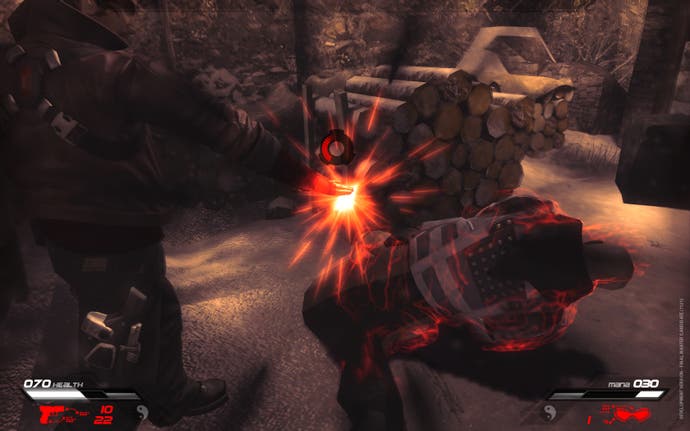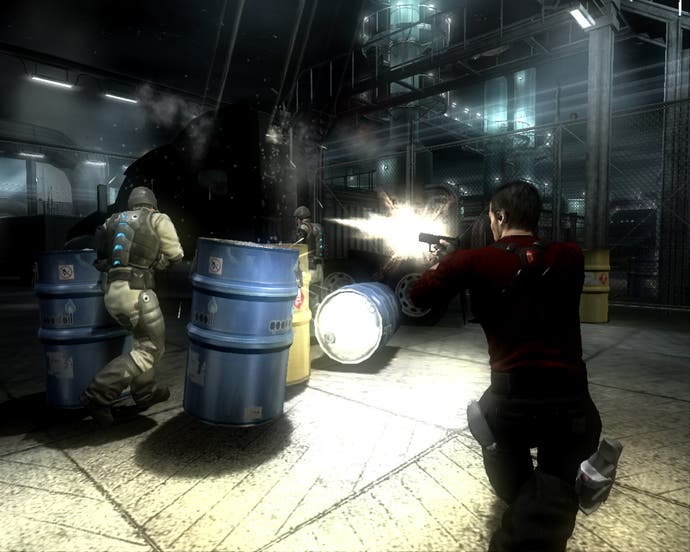Infernal
Now there's a name that's asking for it.
Back at the start of Infernal, Dave Angeldevil, or whatever the hell its straight-out-of-some-dismal-crap-on-Sky-One-around-11pm hero is called, is given a demonic power that can demolish metal doors and brick walls. It's actually pretty cool - the game seems to be demonstrating that it's over-the-top, it's got decent physics and Dave's (alright, alright - 'Ryan Lennox', but the other name suits him better) a proper badass, living up to his status as a fallen angel now working for the forces of darkness (or at least some guy with a spooky voice). Which only makes it all the more surprising that Dave spends the next few hours being obstructed by wooden doors and flimsy chain barriers that his new ultra-destructo-power can't even dent. The answer? Why, trudging around similar-looking corridors looking for keycards and buttons, of course.
Games have got to stop this. With graphical technology at the height it is (Infernal actually looks pretty good, whilst also feeling kind of cheap), creating a world where incredibly heavy explosives cannot affect everyday scenery is increasingly ridiculous.
There are ways to prevent players from escaping a carefully-arranged linear path without totally shattering in-game credibility - forcefields and heavy-duty security doors for instance; things that at least look resistant to firearms - but Infernal's still moping around in the primordial slime on that front. If Dave Angeldevil was the wisecracking, unflappable superpowered hulk he's supposed to be, he wouldn't waste his time scouring rooms full of barrels for switches to push so that a small glass panel on the other side of the room would slide open. He'd crash through walls, tear men limb-from-limb, repeatedly bellow "Look at me! I'm AWESOME" and finish the game in 20 minutes. He probably also wouldn't meet instant death from a 10ft drop, but then the game never explicitly states that an unfortunate side-effect of all his magic powers isn't having a horribly weak spine.

So, near-future shooter, awful, puerile, heavy guitar soundtrack, deep-seated misogyny, pop-up baddies, AI that always chooses something highly explosive to stand next to, almost total obliviousness to the shooter landscape post-Half-Life, Halo et al. Yep, SiN: Emergence by any other name still smells like rotting meat. Infernal's from a third-person perspective and slots in about four puzzle types on regular rotation, but otherwise it's exactly the same kind of hollow brawn that never got over early 90s videogame box art as the mercifully terminated (or at least on indefinite hiatus) SiN episodes were. Even some of the baddies are essentially interchangeable. But while that had at least flashes of a poorly-realised attempt to be tongue-in-cheek, Infernal takes itself deadly seriously. Initial talk of sex and high blasphemy reveal a game that believes itself to be mature, but in reality it's brash, testosterone-soaked, stupid and probably thinks Michael Bay movies are the highest artform known to humankind. Given its silly story, perhaps it's just read too many comics that concern a modern-day war between heaven and hell, in which case it should really put down the Spawn books and read some Preacher instead.
In other ways though, it's a superior game to the last SiN. Presentation values are all over the place (not least in some particularly excruciating voicework) and it lacks the vaguely cinematic grandness that made SiN: Emergence at least bearable, but it has more variety and ideas. Not remotely new ideas - the spectral vision is straight from the Soul Reaver games and the temporary teleport was recently seen in Prey - but they do reveal an intent to be more than a pure bulletforce game. At times, hitting a (usually rather too obviously signposted) obstacle and knowing which of Dave's handful of otherwordly abilities will overcome it creates the requisite sense of fluid omnipotence he's supposed to have. There's also some passably thoughtful boss fights - we're not talking Zelda here, but most aren't purely shoot-until-dead. There's plenty of shooting and deading involved, but usually at least one of the demonic powers is called for too.

Occasionally toyed with is a light/dark environmental element that affects whether Dave is gaining or losing magic juice. It's tragically underplayed, used almost solely as a mechanism to ensure he doesn't have his best powers during the toughest fights, but once in a while shooting out the lights so that he can then turn a torrent of arcane force onto a horde of identikit troops feels pretty good. Health, mana and ammo collection is dealt with neatly too - Dave can eat souls. Eating souls makes him stronger. It's inarguably crazy videogame logic at work, but, at least in the context of Infernal's over-earnest holy versus evil but with guns plot, it feels a lot less silly than picking up white boxes with red crosses on.
Again though, it's undermined by too much time spent trekking through corridors, stairwells and rooms full of unopenable doors looking for keycards and getting shot in the back by men-from-nowhere. Staples of a great many FPSes for sure (and really this is an FPS in almost every way - the third person camera only seems to be there due to a misguided belief about how super-cool the lead character looks), but maddeningly overplayed here. Though generally it's pretty obvious what does what, the architectural similarities within each level means there's a little too much confused backtracking as Dave tries to find out which identical door the switch is hidden behind. Clearly, a lot of time has been spent on the depressingly videogamey character designs (monks with cyber-armour! Girls in PVC catsuits! Small-bearded anti-hero with tattoos!), and nowhere near enough on level structure.
Infernal has very little interest in fighting against any of the clichés of videogaming. This serves to make it both somewhat objectionable and the sort of thing you can accidentally lose a weekend to that you honestly did not enjoy. In its better moments it's a guilty pleasure, in its worst it's embarrassingly retrograde. By being consistently fairly slick with it, it easily avoids skimming the lowest depths, but really it's the kind of game we've all long since grown out of. Or so I like to tell myself, anyway.








